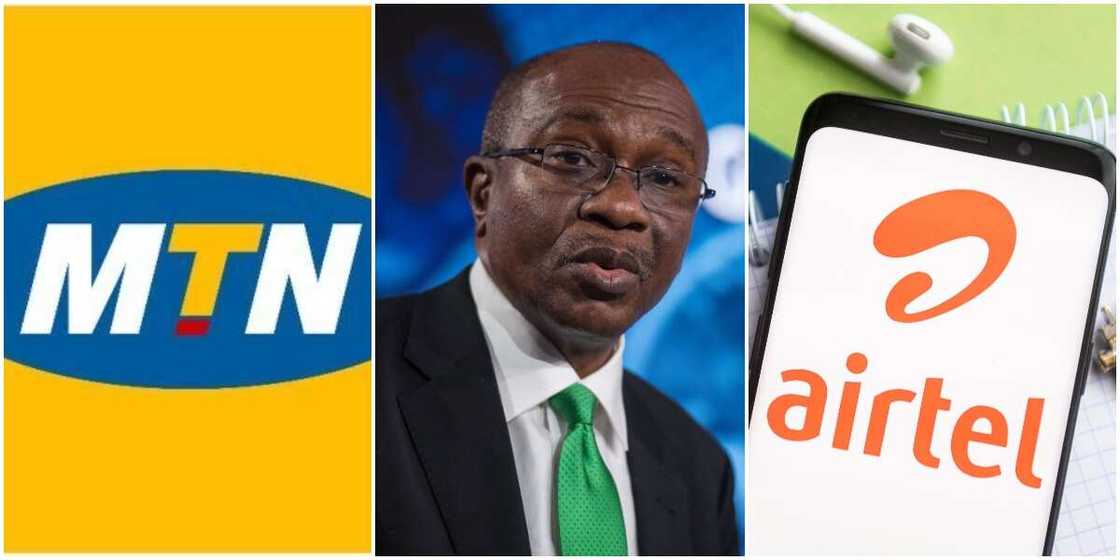Nigerians to now pay N6.98 for every USSD code transaction - CBN
- MTN, Airtel, Glo, 9mobile to charge bank customers N6.98 per USSD transaction from today
- Nigerian banks will collect the USSD charge on behalf of the network providers
- The per-transaction charge will replace the per session billing initially collected before a disagreement between banks and telcos
Nigerian bank customers will now pay a new charge for the use of unstructured supplementary service data (USSD) code for transactions. The Central Bank of Nigeria (CBN) said the new charge will begin today, Tuesday, March 16, 2021.
In a statement released by the apex bank, customers who transact with banks' USSD codes will pay N6.98 kobo to the network providers per transaction, but the charge will be received by the lenders on behalf of the telecoms.
There have been confrontations about the charge attracted by the use of the mobile code, resulting in the network providers threatening to withdraw the service from the banks. The disagreement has led to accumulated outstanding fees owed to the mobile operators.
In order to end the feud between both sectors, the CBN met with the Nigerian Communications Commission, Association of Licensed Telecoms Operators of Nigeria, Association of Telecommunications Companies of Nigeria, and the deposit money banks on Monday, March 15, 2021.
PAY ATTENTION: Subscribe to Digital Talk newsletter to receive must-know business stories and succeed BIG!
During the meeting, the new USSD charge was agreed on, but the implementation process hasn't been approved. But the per-transaction billing is expected to replace the per session billing previously used before the disagreement.
It was confirmed by the financial regulator, that regardless of the number of sessions done before a transaction goes through, the deducted charge won't be more than what was agreed during Monday's meeting.
Prior to the new agreed charge, customers were charged per session of the USSD service regardless if the transaction goes through or not. Both the banks and telcos exchanged blame for the previous charge structure.

Source: UGC
Highlights from the meeting
- To promote transparency in its administration, the new USSD charges will be collected on behalf of MNOs directly from customers' bank accounts. Banks shall not impose additional charges on customers for use of the USSD channel.
Pay attention: Join a community of CEOs, founders and decision-makers: subscribe for a free monthly business newsletter Digital Talks and succeed BIG!
- A settlement plan for outstanding payments incurred for USSD services, previously rendered by the MNOs, is being worked out by all parties in a bid to ensure that the matter is fully resolved.
- MNOs and DMBs shall discuss and agree on the operational modalities for the implementation of the new USSD pricing framework, including sharing of Application Programme Interface (API) to enable seamless, direct and transparent customer billing.
- DMBs and MNOs are committed to engaging further on strategies to lower cost and enhance access to financial services.
- With the above resolutions, the impending suspension of DMBs from the USSD channel is hereby vacated. Therefore, DMBs shall no longer be disconnected from the USSD channel.
Meanwhile, Legit.ng had reported that the CBN governor, Godwin Emefiele, and the World Trade Organisation director-general, Ngozi Okonjo-Iweala, will meet to discuss Nigeria's multiple exchange rates.
Okonjo-Iweala said members of the WTO are complaining of the multiple exchange rates regime, and Nigeria needs to explain to these countries why it is utilising such structure for exchange of forex.
Fakoyejo Olalekan is a Business and Financial Journalist with over three years of experience in covering finance and business activities within Nigeria and offshore. Prior to joining Legit.ng, he worked at Nairametrics where he wrote financial and investment analysis articles. Olalekan is a resourceful and result-driven journalist with a track record for conducting extensive research and interviews to produce articles that provide different perspectives to market activities.
Source: Legit.ng


